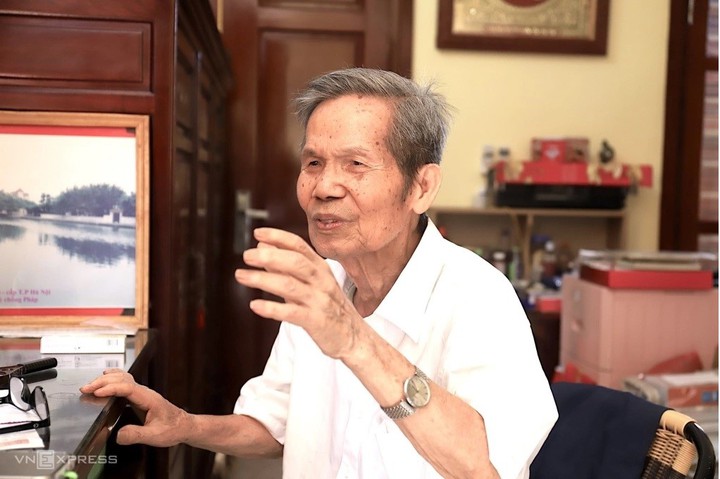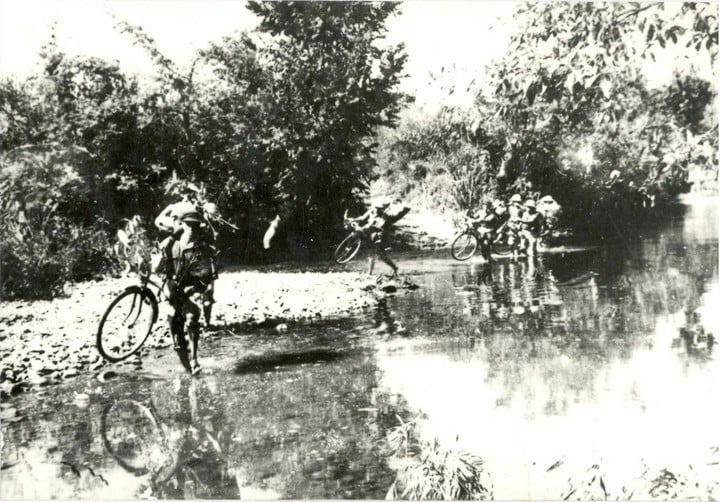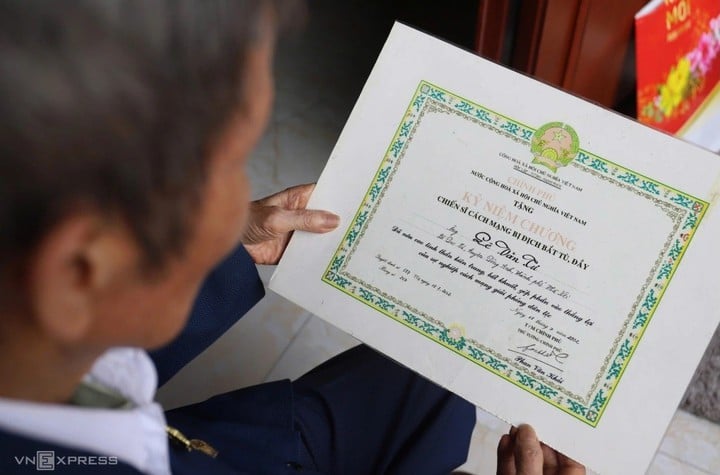At the age of 91, Mr. Tu still clearly remembers December 6, 1953, the beginning of a series of days of brutal torture in a French colonial prison.
That day, after delivering a secret letter, 18-year-old postman Le Van Tu was hiding in a secret tunnel under a pigsty in Song Thap village, Chau Khe commune, Bac Ninh province when he was pointed out. French soldiers swooped in and arrested him.
They stripped him naked and paraded him around the village to show off his power because he "dared to follow the Viet Minh". In front of the villagers, they used a hammer to smash his big toe and used their iron-clad fists to punch out his teeth. "Where is the Bac Ninh District Party Committee? Who is the leader? Where is Company 529?", they repeatedly asked, but received only silence in return.
Unable to get any information from him, the French sent him to Nha Tien Prison (now 175 Nguyen Thai Hoc, Hanoi). This was one of the most notorious prisons in Indochina, detaining and brutally torturing many cadres, revolutionary soldiers and political prisoners from many northern provinces. Here, the young man Le Van Tu had to endure three rounds of torture every day with savage blows.
The first round was the "foot beating". The jailers and guards used their iron-clad hands to repeatedly punch him in the face, stomach, and chest until he passed out. The next round was the "water beating". The jailers held his head in a bucket of water until he suffocated, then pulled him out, placed a wooden board on his stomach, and the guards jumped on it to force the water out. The last round of the day was the "electric shock". One electrode was attached to the bridge of his nose, the other to his genitals, and each time the electricity ran through his body, it made his whole body convulse. After each beating, they interrogated him.
"They beat me until I was exhausted, and I was as soft as a noodle," Mr. Tu recalled. "I would rather die than confess."
After 10 days and nights, the 52 kg body of the 18 year old Le Van Tu was reduced to 32 kg of skin and bones, covered with injuries. With no results, the enemy put him in a prison cell. Six months later, in June 1954, he successfully escaped from prison and immediately returned to the Bac Ninh Provincial Post Office to continue his mission.
"I didn't think about the wound, just remembered Uncle Ho's teachings: 'Communication is the most important thing in revolutionary work, because it determines the unity of command, the distribution of forces and thus ensures victory', so at all costs we must return to the organization," he said.
Before being arrested and subjected to months of torture, postman Le Van Tu had faced the line between life and death many times to help keep the "communication bloodline" open.
Former postman Le Van Tu, 91 years old, talks about his time as a postman during the resistance war against the French at his home in Dong Anh, Hanoi, on the afternoon of September 16. Photo: Nga Thanh
Mr. Tu was the third child in a family of four siblings who all participated in the resistance war in Duc Tu commune (formerly Bac Ninh province, now Dong Anh, Hanoi). In 1951, when he was only 16 years old, he volunteered to join the postal service. He soon realized the importance of the job, because Bac Ninh at that time was a strategic area, the northern gateway to Hanoi, a vital traffic hub with National Highway 1A and the railway. The French army concentrated here to control the entire Northern region.
"To fight the enemy, we had to be able to transmit information. At that time, there were no telephones or primitive radios, so transmitting information completely relied on people," he analyzed.
At that time, Bac Ninh Province Post Office had nearly 400 people, responsible for communication for 10 districts. After a short training course, Mr. Tu began his journeys, each time he set off, he risked his life.
Postmen like Mr. Tu are like red blood cells running through the information veins serving the resistance. They have the duty to transmit orders and documents, connecting the rear with the front line. Their job is not only to sneak through enemy posts but also to cross "fire coordinates", where bombs plow and bullets plow. The level of danger and sacrifice of postmen is no different from that of soldiers on the front line. The postal industry at that time had an unwritten rule: the first person to fall, the next person must suppress the pain to rush forward. "Orders are supreme, the information veins are never allowed to be broken," Mr. Tu said.
On each trip, he carefully researched the field. There were mail deliveries that were only a few kilometers long, but many times he had to trek through forests and cross rivers for more than 40 kilometers.
"We postmen always carry grenades, ready to sacrifice ourselves rather than let confidential documents fall into enemy hands. If we are surrounded and captured, our letters must be buried in the mud to destroy evidence," he said.
Couriers transporting documents serving the Dien Bien Phu Campaign through Nho Quan, Ninh Binh in early 1954. Photo courtesy
During his four years as a postman during the resistance war, he couldn't remember how many raids he had to endure and how many times he had to face death. "But I was luckier than many of my comrades," he said sadly.
He mentioned his comrades who had sacrificed their lives, such as Mr. Nguyen Van Bau, Head of Gia Lam Post Office, who was shot dead on the Red River in 1947; postman Nguyen Tien Ai who was shot in the middle of Cau River, and his body was not found until three days later; or two female postmen Nguyen Thi Chuoc and Sai Thi Hang of Thuan Thanh Post Office (Bac Ninh) who were shot by the enemy and their bodies were exposed in the middle of Highway 38.
During the 9 years of resistance against the French, despite the primitive means and mainly relying on their feet, Mr. Tu and the staff of Bac Ninh Post Office overcame all dangers to complete their missions. The entire unit had more than 300 people captured and imprisoned by the enemy, and more than 100 people sacrificed their lives.
After 1954, Mr. Le Van Tu continued working in the industry. After 1975, he went to Ho Chi Minh City for four months to support the reform of the postal system in the South.
The Government's commemorative medal for revolutionary soldiers captured and imprisoned by the enemy in 2002 awarded to postman Le Van Tu. Photo: Quynh Nguyen
For his contributions, he was awarded the Second Class Resistance Medal in 1961, the First Class Resistance Medal in 1988 and the Commemorative Medal for Revolutionary Soldiers Captured and Imprisoned by the Enemy in 2002, along with many other certificates of merit.
"From postmen like us who trekked through forests and through bombs and bullets, the Vietnamese postal industry has made great strides with breakthrough applications in science and technology. Those are things that our generation at that time could only dream of," said Mr. Tu.
According to VnExpress Newspaper
Source: https://mst.gov.vn/ky-uc-10-ngay-dia-nguc-cua-nguoi-buu-ta-khang-chien-197250924085846418.htm







![[Photo] Prime Minister Pham Minh Chinh inspects and directs the work of overcoming the consequences of floods after the storm in Thai Nguyen](https://vphoto.vietnam.vn/thumb/1200x675/vietnam/resource/IMAGE/2025/10/08/1759930075451_dsc-9441-jpg.webp)
![[Photo] Prime Minister Pham Minh Chinh attends the World Congress of the International Federation of Freight Forwarders and Transport Associations - FIATA](https://vphoto.vietnam.vn/thumb/1200x675/vietnam/resource/IMAGE/2025/10/08/1759936077106_dsc-0434-jpg.webp)




















































































Comment (0)